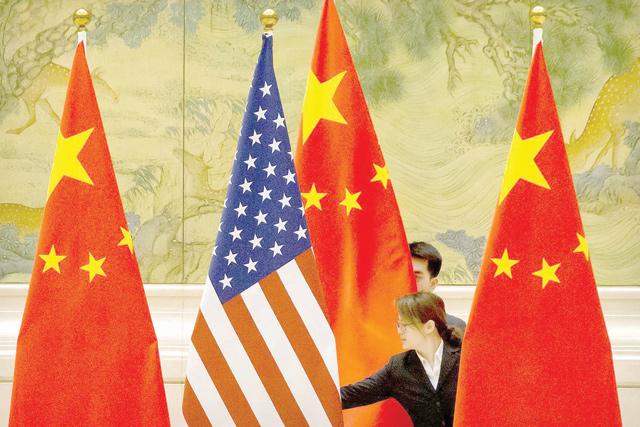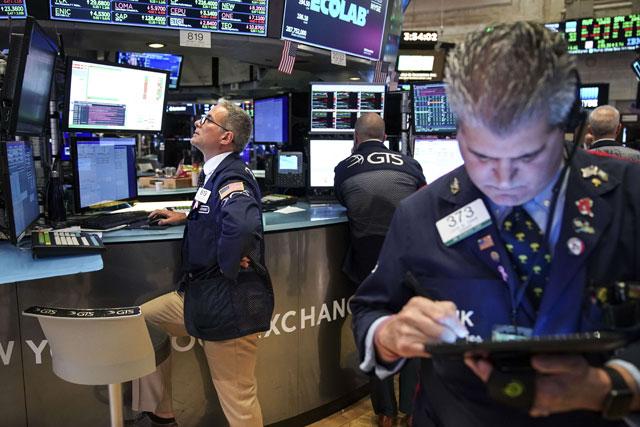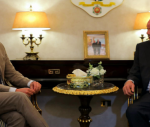You are here
EU warns of WTO challenge in case of China-US deal ‘distortions’
By AFP - Jan 18,2020 - Last updated at Jan 18,2020
BEIJING — The European Union will challenge the China-US trade agreement at the World Trade Organisation (WTO) if it creates "distortions" in the market that harm EU companies, the bloc's envoy to Beijing said on Friday.
Ambassador Nicolas Chapuis told reporters the 28-nation EU "will monitor the implementation" of the "phase one" deal that was signed on Wednesday by President Donald Trump and Chinese Vice Premier Liu He.
"In our opinion, quantitative targets are not WTO-compatible if they lead to trade distortions," Chapuis said. "If it were to be the case, we will go to the WTO to settle this matter."
He said that during a meeting at the Chinese foreign ministry, he was given "formal assurances that in absolutely no way would European businesses be affected by the US-China deal".
The WTO's principle of most-favoured-nation treatment says countries cannot discriminate between trading partners.
Under the deal, China agreed to import an additional $200 billion in US products over two years — above the levels purchased in 2017 — including an extra $32 billion in agricultural goods.
Beijing also pledged to improve protections of US intellectual property.
The US said it would slash in half tariffs of 15 per cent that were imposed on about $120 billion worth of Chinese consumer goods such as clothing in September.
But punitive border taxes will remain on two-thirds of more than $500 billion in imports from China.
When questioned on the matter, Chinese foreign ministry spokesman Geng Shuang said that the deal "is in line with WTO rules and market principles".
Paul Tan of Rajah & Tann law firm in Singapore, who specialises in international dispute resolution, told AFP the deal "may not violate WTO rules because the type of goods being bought from the US could be different from other countries', or even unavailable".
"I don't think the trade deal reversed the increase in tariffs on US goods after the trade war broke out, for example, so I doubt this could be read as more preferential treatment," he said.
Trade squabbles
China's agreement to buy more from the US in effect cushions some of the impact from increased tariffs over the past two years, Tan added.
He noted, however, that such bilateral trade deals seem to be the US administration's preferred method of developing economic relations with its major trading partners, rather than through the WTO — meaning further trade disputes with the US will have to be resolved outside the global trading system.
Kerstin Braun, president of Stenn Group, said on Thursday: "With a weakened WTO and the general trend away from multilateral trade agreements, we're only going to see more trade squabbles."
The current crisis facing the WTO could also mitigate the EU's threat, with Washington having recently forced the body's appeals unit to suspend operations.
The US has long-standing and wide-ranging concerns about the WTO, with its allegedly soft stance on China a main criticism.
Separately to the US-China trade negotiations, the EU has also been trying to reach an agreement with Beijing on investments for almost seven years.
Some of the EU's demands are similar to those of the US, including respect for intellectual property and the end of forced technology transfers by foreign firms operating in China.
Chapuis said discussions on this deal had entered a "crucial stage" and that progress was being made each month, with the ambition to reach an agreement by the end of the year.
A draft deal is expected to feature prominently at a China-EU summit scheduled for March in Beijing with the new EU leaders.
Related Articles
BEIJING — US negotiators head to China on Tuesday to try to hammer out details to end the two countries' trade war, including the shape of a
NEW YORK — Global stocks on rallied Friday as US-China trade negotiations yielded a partial deal, while the British pound surged for a secon
BRUSSELS, Belgium — The EU on Monday launched a WTO challenge against a Chinese anti-subsidy investigation into imports of European dairy pr


















